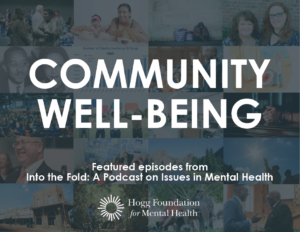 Recently, the Hogg Foundation published the 100th episode of our podcast, Into the Fold: Issues in Mental Health. Launched in 2014, the podcast served as a new way to share the human implications of our grantmaking, and the experiences related to mental health broadly. Through interviews and thought-provoking dialogue, the podcast also highlights the challenges and achievements of mental health advocates, policymakers, service providers, researchers, persons with lived experience, and foundation staff.
Recently, the Hogg Foundation published the 100th episode of our podcast, Into the Fold: Issues in Mental Health. Launched in 2014, the podcast served as a new way to share the human implications of our grantmaking, and the experiences related to mental health broadly. Through interviews and thought-provoking dialogue, the podcast also highlights the challenges and achievements of mental health advocates, policymakers, service providers, researchers, persons with lived experience, and foundation staff.
Today we continue our blog series showcasing a variety of our favorite podcast episodes. Check out the first three in this series for conversations about the impact of our everyday systems on well-being, belonging and inclusion, and recovery. Stay tuned for our final two posts highlighting episodes related to Mental Health Then and Now, and Wisdom for Today.
Note: Short on time? A written summary is provided for most of our podcast episodes.
Start Listening: On Community Well-being
Individual mental health is fundamentally tied to community well-being. This collection of episodes puts the focus on place and the community conditions that support or erode mental health. As we explain on our Vision, Mission and Values webpage, mental health is not solely an individual responsibility but is also a product of our surroundings. The places where people live, learn, work, play and pray can have a significant impact on improving mental health.
Many poor outcomes stem from challenging environmental factors like housing stability, neighborhood infrastructure, and conditions at home, work and school. Community members of all types—from teachers and preachers, to police officers and judges—should understand the importance of mental health and the factors that influence it. Hear from a few experts on the connection between individual and community well-being:
- Episode 59: Fostering Resilience in Our Communities
Wendy Ellis, project director of the Building Community Resilience collaborative at George Washington University, and Lourdes Rodriguez, director of the Center for Place-Based Initiatives at Dell Medical School at The University of Texas at Austin, discuss what community resilience is all about—and how individuals and institutions can come together to achieve it. - Episode 49: Building a Healthy City
Octavio N. Martinez, Jr., executive director of the Hogg Foundation for Mental Health, and Dr. Clay Johnston, director of Dell Medical School, discuss how communities promote mental health and well-being with a focus on Austin, Texas but drawing out key insights that have implications for all communities in Texas and beyond. - Episode 46: Mental Health in a Border Town: It’s About Being Connected
Richard Salcido, executive director of Family Services of El Paso, uses his own city as a jumping off point for a larger discussion about what is needed to strengthen the ability of communities to promote and protect the mental health of their members. - Episode 64: Understanding Rural Communities
Dennis Mohatt is a national expert in the field of rural mental health, and a former member of the foundation’s National Advisory Council. He discusses how the unique characteristics of rural communities affect mental health and the implementation of mental health programs. - Episode 50: Hurricane Harvey, Faith and Resilience
Jameisha Brown, PhD, directs the health ministry at Windsor Village United Methodist Church in Houston. In this episode, she shares with us her hopes and fears for post-Hurricane Harvey Houston, as well as what her experience has taught her about the intersections of faith, resilience and health.
New to the show? Subscribe to the podcast email to receive a notification in your inbox each time we have a new episode. Happy listening!